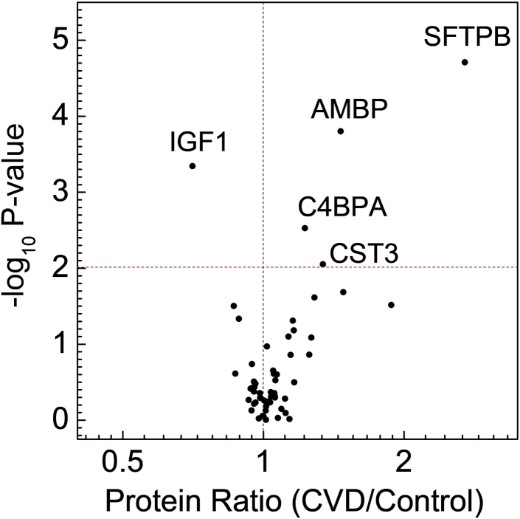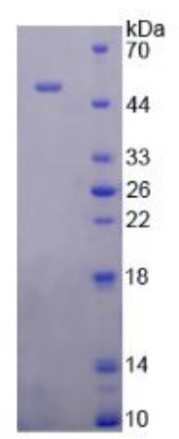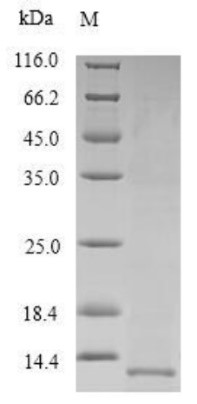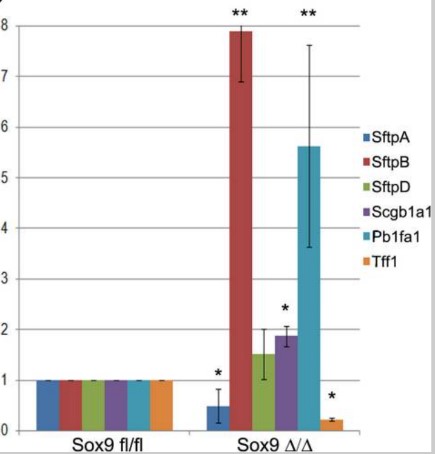SFTPB
-
Official Full Name
surfactant protein B
-
Overview
This gene encodes the pulmonary-associated surfactant protein B (SPB), an amphipathic surfactant protein essential for lung function and homeostasis after birth. Pulmonary surfactant is a surface-active lipoprotein complex composed of 90% lipids and 10% proteins which include plasma proteins and apolipoproteins SPA, SPB, SPC and SPD. The surfactant is secreted by the alveolar cells of the lung and maintains the stability of pulmonary tissue by reducing the surface tension of fluids that coat the lung. The SPB enhances the rate of spreading and increases the stability of surfactant monolayers in vitro. Multiple mutations in this gene have been identified, which cause pulmonary surfactant metabolism dysfunction type 1, also called pulmonary alveolar proteinosis due to surfactant protein B deficiency, and are associated with fatal respiratory distress in the neonatal period. Alternatively spliced transcript variants encoding the same protein have been identified. -
Synonyms
SFTPB; surfactant protein B; SFTP3, surfactant, pulmonary associated protein B; pulmonary surfactant-associated protein B; SP B; 18 kDa pulmonary-surfactant protein; 6 kDa protein; PSPB; PSPB_HUMAN; Pulmonary surfactant associated protein B 18kD; Pulmonary surfactant associated protein B; Pulmonary surfactant-associated proteolipid SPL(Phe); SFTB3; SFTP3; SP-B; SPB; Surfactant pulmonary associated protein B; OTTHUMP00000160684; OTTHUMP00000203252; OTTHUMP00000203253; PSP-B; SMDP1;
- Recombinant Proteins
- Cell & Tissue Lysates
- Protein Pre-coupled Magnetic Beads
- Bovine
- Human
- Mouse
- Pig
- Rat
- E.coli
- HEK293
- HEK293T
- In Vitro Cell Free System
- Insect Cell
- Mamanlian cells
- Mammalian Cell
- Mammalian cells
- Wheat Germ
- Yeast
- Flag
- His
- His (Fc)
- Avi
- His|GST
- His|Myc
- His|T7
- SUMO
- MBP
- Myc
- DDK
- Myc|DDK
- N/A
- N
- Background
- Quality Guarantee
- Case Study
- Involved Pathway
- Protein Function
- Interacting Protein
What is SFTPB protein?
SFTPB (surfactant protein B) gene is a protein coding gene which situated on the short arm of chromosome 2 at locus 2p11. This gene encodes the pulmonary-associated surfactant protein B (SPB/SFTPB), an amphipathic surfactant protein essential for lung function and homeostasis after birth. Pulmonary surfactant is a surface-active lipoprotein complex composed of 90% lipids and 10% proteins which include plasma proteins and apolipoproteins SPA, SFTPB, SPC and SPD. The surfactant is secreted by the alveolar cells of the lung and maintains the stability of pulmonary tissue by reducing the surface tension of fluids that coat the lung. The SFTPB enhances the rate of spreading and increases the stability of surfactant monolayers in vitro.
What is the function of SFTPB protein?
The SFTPB protein is a key component of the pulmonary surfactant system. It performs essential functions in the lungs, particularly in the proper functioning of the respiratory system. The main function of SFTPB is to improve the surface tension properties of the lung alveoli. SFTPB specifically contributes to the stability and spreading of surfactant at the air-liquid interface within the alveoli. Additionally, SFTPB is involved in maintaining the structural integrity of the surfactant system and enhancing its immune defense properties.
SFTPB related Signaling pathways
The signaling pathways directly involved in the regulation of SFTPB expression and lung surfactant production are complex and not fully elucidated. However, some of the key signaling pathways reported to influence SFTPB gene expressio. Activation of the Wnt/β-catenin pathway has been shown to upregulate SFTPB expression in lung epithelial cells. Additionally, TGF-β signaling pathway is also related to SFTPB.
SFTPB Related Diseases
Multiple mutations in this gene have been identified, which cause pulmonary surfactant metabolism dysfunction type 1, also called pulmonary alveolar proteinosis due to SFTPB deficiency, and are associated with fatal respiratory distress in the neonatal period. Mutations or deficiencies in the SFTPB gene can lead to respiratory distress syndrome (RDS), a life-threatening condition characterized by the inability of the lungs to produce sufficient surfactant. Additionally, SFTPB deficiency can lead to other lung diseases like hereditary pulmonary alveolar proteinosis.

Fig1. Relative HDL protein levels in patients with incident CVD subjects and control subjects.
Bioapplications of SFTPB
Exogenous SFTPB formulations can be used to supplement or replace dysfunctional or deficient lung surfactant, improving lung function in patients with respiratory disorders. Additionally, SFTPB may be useful as a biomarker for early detection and diagnosis of related diseases. Another potential application of SFTPB research is identifying and characterizing small molecules or drugs that modulate SFTPB expression or function.
High Purity

Fig1. SDS-PAGE (SFTPB-1719H) (PROTOCOL for western blot)
.

Fig2. SDS-PAGE (SFTPB-2223H)
Case Study 1: Anjali Jacob, 2017

Fig1. Immunogold labeling of mature SFTPB and SFTPC in day 30 RUES2 alveolospheres.
Case Study 2: Gianluca Turcatel, 2017

Fig2. surfactant protein B (Sftpb) and Pb1fa1 dramatically increased, by ~8- and 5-fold, respectively, and secretoglobulin, family 1A, member 1 (Scgb1a1) modestly, but significantly, increased in the absence of Sox9 in vivo.
SFTPB involved in several pathways and played different roles in them. We selected most pathways SFTPB participated on our site, such as Defective CSF2RA causes pulmonary surfactant metabolism dysfunction 4 (SMDP4), Defective CSF2RB causes pulmonary surfactant metabolism dysfunction 5 (SMDP5), Defective pro-SFTPB causes pulmonary surfactant metabolism dysfunction 1 (SMDP1) and respiratory distress syndrome (RDS), which may be useful for your reference. Also, other proteins which involved in the same pathway with SFTPB were listed below. Creative BioMart supplied nearly all the proteins listed, you can search them on our site.
| Pathway Name | Pathway Related Protein |
|---|---|
| Defective CSF2RA causes pulmonary surfactant metabolism dysfunction 4 (SMDP4) | CSF2RA;CSF2RB;SFTPC;SFTPB |
| Defective CSF2RB causes pulmonary surfactant metabolism dysfunction 5 (SMDP5) | SFTPC;SFTPB;CSF2RA |
| Defective pro-SFTPB causes pulmonary surfactant metabolism dysfunction 1 (SMDP1) and respiratory distress syndrome (RDS) | CCDC59;SFTPB |
| Defective pro-SFTPC causes pulmonary surfactant metabolism dysfunction 2 (SMDP2) and respiratory distress syndrome (RDS) | SFTPB;SFTPC |
| Disease | HDAC5;CYP11A1;CTBP2;GPC6;CUX1;CHMP4B;PDCD6IP;ACAN;SUPT4H1 |
| Diseases associated with surfactant metabolism | SFTPC;CCDC59;SFTPB |
| Diseases of metabolism | MTRR;FDX1L;CYP11A1;SFTPC;FDX1;CCDC59;MMAA;AMN;EPM2A |
| Metabolism of proteins | TRAPPC6A;SCMH1;CALCA;GPR116;MUC21;IGFBP6A;CHCHD4;IGFBP6;PFDN2 |
SFTPB has several biochemical functions, for example, G-protein coupled receptor binding, enzyme activator activity. Some of the functions are cooperated with other proteins, some of the functions could acted by SFTPB itself. We selected most functions SFTPB had, and list some proteins which have the same functions with SFTPB. You can find most of the proteins on our site.
| Function | Related Protein |
|---|---|
| G-protein coupled receptor binding | ARRB2;GNAL;RSPO2;HAND2;GNAT3;GHRL;SAA1;S1PR2;FYN |
| enzyme activator activity | CXCL1;SEC14L2;MMP17;PSAP;DCP1A;GMFG;ALDH1A2;RAB3GAP2;GM749 |
SFTPB has direct interactions with proteins and molecules. Those interactions were detected by several methods such as yeast two hybrid, co-IP, pull-down and so on. We selected proteins and molecules interacted with SFTPB here. Most of them are supplied by our site. Hope this information will be useful for your research of SFTPB.
- Q&As
- Reviews
Q&As (5)
Ask a questionThe measurement of SFTPB levels is relevant in conditions such as respiratory distress syndrome, interstitial lung diseases, and certain genetic disorders affecting surfactant production.
Research on SFTPB provides insights into the molecular mechanisms of lung function, facilitating the development of targeted drugs to address surfactant deficiencies.
Advancements in genetic testing and imaging technologies have improved the accuracy and efficiency of detecting SFTPB abnormalities, aiding in early diagnosis.
Yes, mutations in the SFTPB gene can lead to dysfunctional SFTPB protein, contributing to various respiratory diseases.
Clinical diagnosis involves assessing respiratory symptoms, conducting imaging studies, and performing genetic testing to identify mutations in the SFTPB gene.
Customer Reviews (3)
Write a reviewIts outstanding performance, coupled with its ease of use, has enhanced the overall efficiency and accuracy of my research.
The SFTPB Protein has greatly contributed to the success of my experiments, providing reliable and robust data.
I highly recommend the SFTPB Protein to researchers seeking a reliable and high-performing protein for their ELISA assays and protein electron microscopy structure analysis.
Ask a Question for All SFTPB Products
Required fields are marked with *
My Review for All SFTPB Products
Required fields are marked with *


